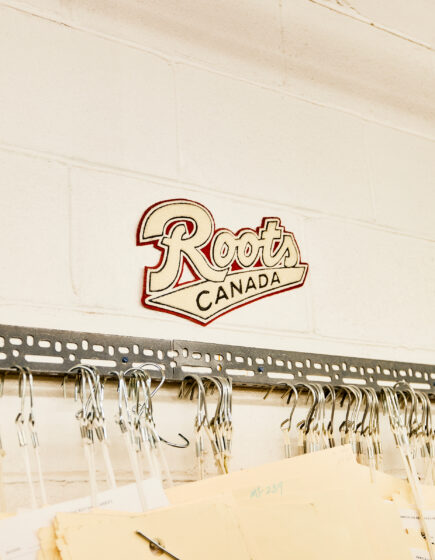



Anian Photo by Taylor Burk
Canada is often described as a cultural mosaic, and its fashion brands reflect that description, straying from solely athleisure and workwear, the (double denim) Canadian tuxedo, and long-standing department stores.
This country’s variety of unique brands provides innovative styles (many rooted in sustainability) from the slopes to the streets, and cements them in Canada’s brief history of fashion. The Canadian origins of many contemporary brands seen on celebrities—including the late Virgil Abloh clad in Arc’teryx on the runway during Paris Fashion Week, for example—may fly under the radar.
Here, we’ve compiled a list of brands that continue to carve a path for Canadian fashion design—and its wide range.

Photo by Amanda Pratt
In our Spring 2024 Issue 100, we feature looks from leading Canadian fashion designers Jack Victor, Maguire, A Bronze Age, MAR by Maria Kamini, James Coward, Libero, and more.
___

Photo by Luis Mora
As the company looks toward the future, Gollish is focusing on redefining the brand codes for a new customer. “In the realest way, Roots definitely stands for craftsmanship, authenticity, heritage, and sustainability,” he says. —Josh Greenblatt
___

Photo by Norihisa Hayashi
Arc’teryx was founded in 1989 by a pair of rock-climbing enthusiasts, who derived the name and fossil logo from the Archaeopteryx lithographica, the 150-million-year-old revolutionary creature presumed to be the link between dinosaurs and birds. The brand has since evolved from making harnesses and climbing gear to the high-tech, high-quality performance wear. —Josh Greenblatt
___

Photo by Patrick Ryder
Upstart Toronto designer Adam Appugliesi’s clothing brand, Libero, takes its name from the Italian word for “free,” which also happens to be his grandfather’s name. Fittingly, it is his Italian Canadian background that informs Libero’s proletarian, masculine-leaning but gender-free designs. —John Clegg
___

Montreal-based sustainable clothing brand &Or Collective wants you to be eco-conscious with your wardrobe. At the core of &Or’s designs is a Stoll technical knitting machine similar to a 3D printer. Fed by a string of yarn, it knits an entire front or back panel of a garment in one continuous piece, resulting in less than 1 per cent of textile waste—compared to 15 per cent in a traditional cut-and-sew technique. —Lauren Edwards
___

Photo by Nathan Legiehn
Since launching, Bather has expanded its product line to include sweatpants and hoodies, toques, tote bags, and camp shirts, among other items, and opened a flagship boutique on Toronto’s Dufferin Street. Bather has also recently reaffirmed its commitment to exploring 100 per cent recycled fabrics. —John Clegg
___

Photo by Taylor Burk
“The best piece of clothing you have is the piece you already have. So it was with that mindset that this whole circular model sort of came into fruition from a clothing standpoint. Now as the brand has grown, that same basic idea has still stuck with us,” he says. The brand he is talking about is Anián, a clothing company based in Victoria that uses recycled fibres from landfills, giving utility to fabrics that have been discarded before their time. —Jack Lowe
___

Photo by Ashley Rowe
Sasha Jardine of SteMargScot launched her colourful wool outerwear brand in 2023 after being mystified by the sea of uniform synthetic puffer coats worn by Canadians each winter. Her products, made in Canada from Canadian and British wool, is a line of genderless coats, bags, and flower brooches, available in 10 bright hues, putting a modern spin on a heritage material. —Lauren Walker-Lee
___

In a little country workshop in Brigham, Quebec, La Compagnie Robinson’s Patrice Didier is handcrafting wallets, belts, log carriers, and other heirloom-quality items out of sturdy vegetable-tanned leather. —John Clegg
___

Walk down any street in Toronto, and you’ll inevitably come across at least one piece from Canadian streetwear label Adidem Asterisks. It might be a pair of Dancing Crepe Shorts on their way to Lula Lounge or the brilliant Gradient Mohair Cardigan waiting on the patio of Mandy’s Salads. Surely, you’ve walked past Adidem’s iconic New Era fitted ballcap, the design that first popularized the brand. —David Stol
___

Photography by Mathieu Fortin and Juan Pablo Fernandez
Transparency is essential for LIVØM, the recently launched Canadian slow-living brand producing sustainable homeware and clothing. Paule Lafrance, co-founder and director of creative and marketing, gets frustrated by companies that claim to be transparent without providing information. “I don’t want to be that type of brand,” she says. —Elia Essen
___

Designer Mani Jassal’s colourful evening wear collections—featuring modern, confident takes on traditional South Asian attire inspired by her Canadian upbringing—have a contemporary, global appeal. —Truc Nguyen
___

“I wanted to be purpose-driven rather than trend-driven, and to take ordinary clothing and put functionality into it,” says Gary Lenett, the co-founder of the Vancouver-based apparel brand DUER. —Livia Hooson
___

Photo by Miro Gacic
As a designer, Olivia Rubens simply isn’t interested in surface-level sustainability. Her eponymous knitwear line features upcycled, plant-based, and recycled fabrics, and the fashion designer holds exacting standards when it comes to responsible sourcing and manufacturing. “I mainly aim to work with social cooperatives for my manufacturing, work with social enterprises in developing new initiatives, and try to give back as much as possible,” Rubens says.
___

Toronto-based fashion and lifestyle brand Golshaah began as an experiment. The Golshaah fashion aesthetic, seen on Canadians Jenny Bird, designer of the eponymous jewellery line, and actor Karine Vanasse, is characterized by its contemporary, structured, and masculine-leaning designs with a focus on layered elements. —Lauren Walker-Lee
___

Ocin
It’s safe to say that finding the perfect swimsuit can be tricky. Whether you’re lounging by the pool or spending the day at the beach, your swimsuit should make you feel confident and secure. The last thing you want to worry about is your top flying off once you hit the water. We have compiled a list of five of our favourite high-quality Canadian swimwear brands to keep you in the swim all summer long. —Caitlin Goff
June 28, 2024